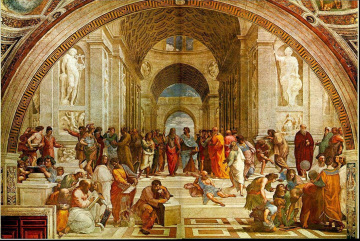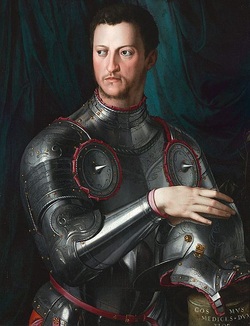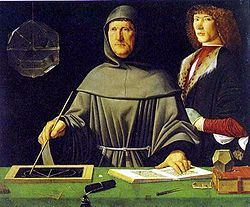The Renaissance
The Renaissance is one of the most important eras in history. Indeed, no other era has had a more profound effect on the course of modern human events. Who we are in the Western world is largely due to this period and the Renaissance has affected our lives in more ways than one. Significant progress in math, science, literature, music, architecture, philosophy and art can be attributed to this era. The term "Renaissance" literally means rebirth but symbolically it represents a reawakening of the Human spirit. It is also the birth of our modern quest for Truth and Knowledge in the past, present and future. Our nation and many others were founded on ideals gleaned from the Renaissance--which in turn borrowed ideas of equality, justice, and political philosophies from Ancient Roman republics and Greek democracies. The impacts of this great age are relevant and obvious to us now, even centuries after they first began.
A Brief Look at the Emerging Renaissance Era

The School of Athens, Raphael, c. 1510.
Europe, just prior to the beginning of the Renaissance era, was awakening itself from the devastating effects of The Plague. The Renaissance era spanned, roughly, between the 15th and 17th centuries, marking the end of the Middle Ages. Shortly after the start of the Renaissance, the Byzantine Empire--which had a profound impact on the Renaissance Era--would fall in 1453. Most scholars of the Renaissance were humanists, or in other words, scholars that believed that knowledge, education, philosophy and the arts can be free from religious impositions. This notion had a profound effect on scholarship and progress in the emerging days of the Renaissance, as most areas of intellectual pursuit were dominated by the Church. The Renaissance also emerged in Italy before spreading to the rest of Europe. This is significant because Renaissance philosophy, art and science borrows heavily from Ancient Rome--which in turn borrowed heavily from the Greeks. That Italy was the seat of the Roman empire cannot be a coincidence. It was during this time that many artifacts from ancient Roman times were exhumed and the love affair between Renaissance thinkers and the Classical Era was born. The painting just to the left is The School of Athens by Raphael (fresco, c. 1510). We can see the reverence and devotion of Renaissance artists to the ancient eras.
The Renaissance, Relgion and Philosophy

Cosimo DeMedici by Agnolo Bronzino, c. 1540's.
As stated before, the Renaissance era was influenced by Humanist scholars, or scholars who believed in knowledge for the sake of knowledge. This in itself was a novel idea for the times, since the Catholic Church had dominated every aspect of people's lives for centuries.
The Renaissance era also gave way to the Protestant Reformation. There was now serious competition to the Catholic Church and the impacts of this movement can be felt even today. For the first time, people were questioning the ultimate authority and blind dedication to established religion. The founding fathers of our nation were also deeply affected by classical thinking and the renewed interest of Roman and Greek political philosophy in the Renaissance promoted the ideals on which they formed the new government.
Moreover, the Renaissance brought about a renewed interest in the occult and mysticism. Hermeticism became influential in the modern thinking of Renaissance scholars along with alchemy and other magical beliefs. Hermeticism originated in Hellenistic (Greek-influenced) Egypt and it is another example of the revival of antiquities in Renaissance Europe. These pursuits were funded in large part by the wealthy elite and the new merchant class. The man in the portrait on the right is Cosimo DeMedici, a patron of Hermeticism, alchemy and other mystic traditions. He also funded research and excavations into the ancient Roman Empire.
Still, Plato and other classical thinkers had an even greater influence on this era. Renaissance thinkers were especially taken with Plato's thoughts on the two realms. The first being the realm of appearance and the second being the realm of the eternal. Plato emphasized the realm of the eternal, or as he called it, the realm of forms. Plato suggests that Man's soul seeks wisdom as a path to returning to the Form of the Good. Plato also believed that this wisdom was gained by the discovery of truths. It was a very different notion than that imposed by the Catholic Church in ages past. These new ideas not only affected Renaissance philosophy, but also the advances made in science and mathematics.
The Renaissance era also gave way to the Protestant Reformation. There was now serious competition to the Catholic Church and the impacts of this movement can be felt even today. For the first time, people were questioning the ultimate authority and blind dedication to established religion. The founding fathers of our nation were also deeply affected by classical thinking and the renewed interest of Roman and Greek political philosophy in the Renaissance promoted the ideals on which they formed the new government.
Moreover, the Renaissance brought about a renewed interest in the occult and mysticism. Hermeticism became influential in the modern thinking of Renaissance scholars along with alchemy and other magical beliefs. Hermeticism originated in Hellenistic (Greek-influenced) Egypt and it is another example of the revival of antiquities in Renaissance Europe. These pursuits were funded in large part by the wealthy elite and the new merchant class. The man in the portrait on the right is Cosimo DeMedici, a patron of Hermeticism, alchemy and other mystic traditions. He also funded research and excavations into the ancient Roman Empire.
Still, Plato and other classical thinkers had an even greater influence on this era. Renaissance thinkers were especially taken with Plato's thoughts on the two realms. The first being the realm of appearance and the second being the realm of the eternal. Plato emphasized the realm of the eternal, or as he called it, the realm of forms. Plato suggests that Man's soul seeks wisdom as a path to returning to the Form of the Good. Plato also believed that this wisdom was gained by the discovery of truths. It was a very different notion than that imposed by the Catholic Church in ages past. These new ideas not only affected Renaissance philosophy, but also the advances made in science and mathematics.
Science and Mathematics in the Renaissance Era

Portrait of Luco Pacioli by Jacopo de Barbari,(?), 1495.
Science and mathematics flourished in the Renaissance Era. In the past, a lot of the advanced technology and knowledge in Europe came from other parts of the world, such as the Far East and Islamic cultures. It was now Europe's turn to make their mark on the world--through exploration and the development of mathematical and science. The revival of classical philosophy in Europe ushered in a time of progress and advancement that has been rarely rivaled before or since.
Here, again, Plato's influence shines through. Plato believed that the purest truth could be found through the study of mathematics. Advances in geometry, trigonometry and algebra were just a few of the successes of this time. Humanism in Europe led to a quest for knowledge and thirst for discovery. Navigation in this era led to the need for better mapmaking, which could be achieved through better mathematical skill. (Tangent: The discovery of the Americas by Columbus was due in large part to a mathematical error!) Astronomers such as Kepler and Galileo gave shape to our universe and the stars. They gave a scientific basis to astronomy through research, mathematics and the scientific process. This is important because they suggested that Earth (or symbolically Man) was not at the center of all things.
Additionally, merchants were doing more and more business as the European economy grew. Thus, the need for complex accounting and financing systems grew as well. Some of the most important results of the advancement of the scientific and mathematical traditions in Renaissance Europe affected a most unusual area of culture---the ARTS.
Here, again, Plato's influence shines through. Plato believed that the purest truth could be found through the study of mathematics. Advances in geometry, trigonometry and algebra were just a few of the successes of this time. Humanism in Europe led to a quest for knowledge and thirst for discovery. Navigation in this era led to the need for better mapmaking, which could be achieved through better mathematical skill. (Tangent: The discovery of the Americas by Columbus was due in large part to a mathematical error!) Astronomers such as Kepler and Galileo gave shape to our universe and the stars. They gave a scientific basis to astronomy through research, mathematics and the scientific process. This is important because they suggested that Earth (or symbolically Man) was not at the center of all things.
Additionally, merchants were doing more and more business as the European economy grew. Thus, the need for complex accounting and financing systems grew as well. Some of the most important results of the advancement of the scientific and mathematical traditions in Renaissance Europe affected a most unusual area of culture---the ARTS.
